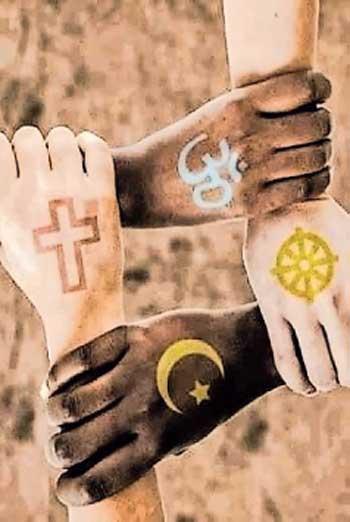Reply To:
Name - Reply Comment
Last Updated : 2024-04-20 00:00:00
 Great social crisis like the one we are in now, are often explained through narratives and discourses about the past. In other words, there are powerful stories about the past that claim to provide political solutions for current problems and future possibilities. Such stories often legitimised as history are always about something we have lost from the past; the great visionary kings, the idyllic sustaining villages and the values surrounding the temples.
Great social crisis like the one we are in now, are often explained through narratives and discourses about the past. In other words, there are powerful stories about the past that claim to provide political solutions for current problems and future possibilities. Such stories often legitimised as history are always about something we have lost from the past; the great visionary kings, the idyllic sustaining villages and the values surrounding the temples.
I explore here the historical relationship between religion and politics, and how together they influence contemporary Sri Lanka. But that raises the question as to what we mean by religion in relation to politics. Is it about religious doctrine, religious values of the followers, daily religious practices including rituals or the character of religious institutions including the clergy?
 I argue that religion, with its many facets, is embedded in our social life, and has always been part of politics. We can neither banish religion to the private domain of individuals nor confine it to within the walls of the temple. Whether we like it or not, we are going to have to engage with religious discourses, practices and institutions particularly as they impinge on our political life. Furthermore, as with any other social institution and force, the influence of religion on politics depends on the times and is subject to appropriation and collusion by other forces and actors. In this context, it is the fusion of religion with nationalism that can be deadly in undermining the plural fabric of society and coexistence.
I argue that religion, with its many facets, is embedded in our social life, and has always been part of politics. We can neither banish religion to the private domain of individuals nor confine it to within the walls of the temple. Whether we like it or not, we are going to have to engage with religious discourses, practices and institutions particularly as they impinge on our political life. Furthermore, as with any other social institution and force, the influence of religion on politics depends on the times and is subject to appropriation and collusion by other forces and actors. In this context, it is the fusion of religion with nationalism that can be deadly in undermining the plural fabric of society and coexistence.
Scholarship on religion
The modern state with its tremendous powers was thought to restrict the powers of the religious institutions, which had considerable social, economic and political power in the pre-modern era. Indeed, the idea of a secular state was meant to once and for all contain the influence of religion, with the separation of the state and church. But as we see from the statements of every American President who says, “God Bless America” to what is etched in the US currency notes, “In God We Trust”, religion is ever present; from the words of the head of empire to the money considered the global currency.
The situation, is no different in our part of the world, where Independence and the promise of the postcolonial nation-state did not result in a secular state. Rather, assertions by so-called religious actors have weighed on constitutional questions and state policies. Worse, such religious mobilisations have also periodically descended into mass violence.
In this context, some of our best sociologists, anthropologists and historians have devoted much energy to both understand the persistence and power of religious influence on politics and to respond to the dangers inherent in that tendency. Gananath Obeyesekera, S. J. Tambiah, Kumari Jayawardena, R. A. L. H. Gunawardena, H. L. Seneviratne, Newton Gunasinghe and Shahul Hasbullah, are some of those scholars who immediately come to mind. Through analysis of historical changes and everyday practices, they showed how religion, particularly Buddhism, had transformed during the colonial period, mimicking Western religions that had evolved in tandem with the modern state and capitalism. Furthermore, they elaborated on the plural and hybrid character of religious practices of the people, and exposed how elite political mobilisations used religious institutions and discourses towards communal ends culminating in the ethnic conflict.
 Sadly, to this day we are grappling with the same issues, as with the majoritarian assertions of Sinhala Buddhist ideologues and the anti-Muslim mobilisations that have gained centre stage. Attacks on devolution of power to the provinces and calls for the abolition of personal laws and customs of minorities are based on the ideology of a unitary Sinhala Buddhist past in Sri Lanka. In the North, which I am more familiar with, there is a nascent Hindu movement in Jaffna, similar to the chauvinist Hindutva movement in India. In the Mannar District, polarisation along Christian, Hindu and Muslim lines undermines coexistence. In other words, over the last two centuries to the present moment, and from national mainstream to the regional periphery, we are confronted with the issues of religion and politics.
Sadly, to this day we are grappling with the same issues, as with the majoritarian assertions of Sinhala Buddhist ideologues and the anti-Muslim mobilisations that have gained centre stage. Attacks on devolution of power to the provinces and calls for the abolition of personal laws and customs of minorities are based on the ideology of a unitary Sinhala Buddhist past in Sri Lanka. In the North, which I am more familiar with, there is a nascent Hindu movement in Jaffna, similar to the chauvinist Hindutva movement in India. In the Mannar District, polarisation along Christian, Hindu and Muslim lines undermines coexistence. In other words, over the last two centuries to the present moment, and from national mainstream to the regional periphery, we are confronted with the issues of religion and politics.
Nation, majority and religion
These concerns require continued scholarly and activist engagement, even if major changes can only come from within each religious fold and movements for ecumenical dialogue. However, what are the more decisive and worrying changes and what is at stake?
The great Indian historian, Romila Thapar, in a seminal article in 1989 titled, ‘Imagined Religious Communities? Ancient History and the Modern Search for a Hindu Identity,’ had the following to say about majoritarian religious political influences in India, which I quote here at length due its relevance for our own context:
“Communalism in the Indian sense therefore is a consciousness which draws on a supposed religious identity and uses this as the basis for an ideology. It then demands political allegiance to a religious community and supports a programme of political action designed to further the interests of that religious community. Such an ideology is of recent origin but uses history to justify the notion that the community (as defined in recent history) and therefore the communal identity have existed since the early past. Because the identity is linked to religion, it can lead to the redefinition of the particular religion, more so in the case of one as amorphous as Hinduism.
Such identity tends to iron out diversity and insists on conformity, for it is only through a uniform acceptance of the religion that it can best be used for political ends. The attempt is always to-draw in as many people as possible since numbers enhance the power of the communal group and are crucial in a mechanical view of democracy. This political effort requires a domination over other groups and where the numbers are substantially larger, there is a deliberate emphasis both on superiority and the notion of majority, a notion which presupposes the existence of various ‘minority communities’. In the construction of what have been called ‘imagined communities’, in this case identified by religion, there is an implied rejection of the applicability of other types of divisions in society, such as status or class.”
These powerful words of Thapar, identifying how history is used in the justification for majoritarian domination, was a call for historians to engage in these debates about the past. She wrote when the BJP was gaining ground in India along with its campaign to build a temple for Rama in Ayodhya, which culminated in the destruction of the Babri Mosque and the ensuing mass violence in 1992.
We are in similar tragic times in Sri Lanka today. The ‘Imagined Communities’ that Thapar speaks of is drawn from the work of Benedict Anderson, who wrote about the origins and spread of nationalism. Indeed, it is the more recent and modern ideology of nationalism that created the nation-state, contrary to popular and historical narratives and discourses that claim an ancient past for the nation-state. And it is religion and nationalism that can be a deadly mix for political mobilisation and mass violence, as we have seen from the many wars a far and also in our own country. We cannot get rid of religious influence in politics, but we should be wary when religion is fused with nationalism for its tremendous destructive capacity.

Add comment
Comments will be edited (grammar, spelling and slang) and authorized at the discretion of Daily Mirror online. The website also has the right not to publish selected comments.
Reply To:
Name - Reply Comment
On March 26, a couple arriving from Thailand was arrested with 88 live animal
According to villagers from Naula-Moragolla out of 105 families 80 can afford
Is the situation in Sri Lanka so grim that locals harbour hope that they coul
A recent post on social media revealed that three purple-faced langurs near t